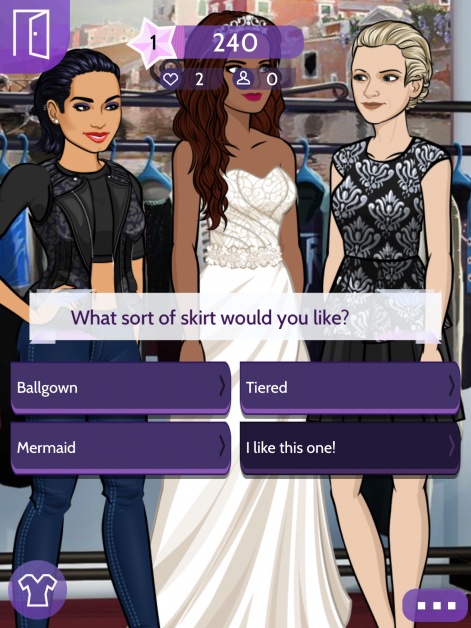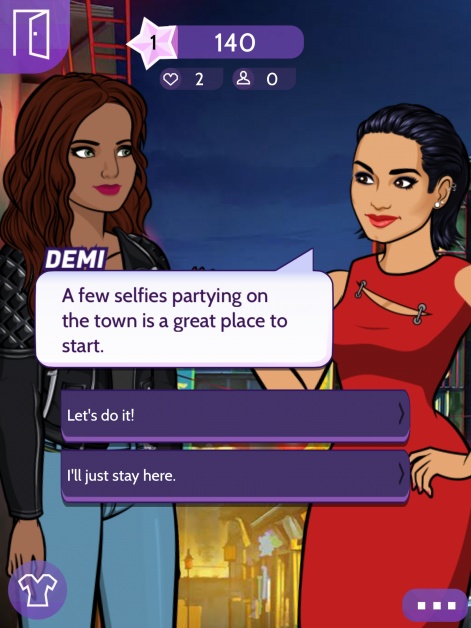While the target audiences of PocketGamer.biz and interaction fiction title Episode, from San Francisco based-developer Pocket Gems, may not exactly overlap, it's hard to deny that the game has become a big success since its 2014 launch.
It's now a top 40 grossing game on the US iPhone chart, with an estimated 7 million monthly active users.
This is largely thanks to Pocket Gems' deals with IPs and brands like Mean Girls and singer Demi Lovato, as well as aggressive, targeted advertising on platforms such as Tumblr.
To get to know more about the game, we asked the Head of Studio at Episode, Michael Dawson, about its development, the use of licenses, and the challenges of running a live service with such an active community.
PocketGamer.biz: Given Pocket Gems' history was social mobile games, what was the inspiration behind making an interactive storytelling app?
Michael Dawson: While our history is tied to casual games, Pocket Gems’ foundation is about building interactive entertainment experiences from the ground up for mobile.
This was basically our approach for Episode. Storytelling is one of the oldest and most pervasive forms of entertainment in the world, yet we don’t have a native format for stories on mobile.
Movies, TV shows, and books are all accessible on mobile, but they aren’t designed specifically for how we use our phones.
We asked ourselves, what’s the best way for someone to interact with a story? How can the story be bite-sized to fit with mobile session lengths? How is it a great experience with or without sound?
Our answer to these questions is Episode.

How long did development on the app and the underlying platform take?
Episode launched in February 2014, but we had been working on it for a couple of years before that to create the underlying platform that would allow users to tell stories on Episode.
Were there any significant obstacles you had to overcome during this process?
Building a platform that could let anyone in the world create an interactive animated story then publish it globally was definitely a challenge!
We’ve had over 2.5 million storytellers sign up to start creating stories.
One of the harder elements was creating our own proprietary scripting language. We wanted to let storytellers work in their usual way, writing great scripts.
Our goal was to make their scripts come to life on a phone, becoming visual stories with great animation and interaction.
It was hard to build this in an intuitive way for storytellers who don’t generally have any animation or engineering backgrounds, yet it’s worked pretty well. We’ve had over 2.5 million storytellers sign up to start creating stories.
How has the importance of user-generated content changed from your original plan to actually operating Episode as a service?
Helping our storytellers tell great stories is core to our vision and our product. This has been true since we launched.
We see stories such as Mean Girls: Senior Year and Demi Lovato: Path to Fame as good examples of what is possible, but we believe some of the best future stories on Episode will come from our users and we’re always looking for new ways to support them.

That said, I’d say the community reaction definitely surprised us. We’ve seen over 17,000 stories published and many more created by our users.
I’d argue that we have the largest community of interactive storytellers in the world.
How do you deal with moderating user-generated content and, more generally, what's your attitude to adult themes within the app?
As I mentioned earlier, we have a very active community of both readers and storytellers who help each other in all sorts of ways.
Many people would kill to write about what happens to Regina and Cady after the first Mean Girls movie.
One way they do this is by flagging stories that violate our content policies. Because of this, we don’t actually have to spend a huge amount of time looking for stories that violate our policies.
If someone does make a story that violates our content policy, we’ll remove it to ensure Episode stays a safe place for anyone old enough to have a Facebook or Instagram account.
But that happens a lot less often than you’d think.
It seems that Episode's popularity took off with the launch of the Demi Lovato and Mean Girls content. Why did you choose these as your first major partnerships, and how difficult were the licenses to acquire?
We were really careful about who we chose to work with for our first licensed stories.
There are all the obvious boxes you need to check such as: does their fan base overlap with our current audience? Can we create a great story? Will our readers think this is exciting?
While Demi Lovato and Mean Girls both check all those boxes, we also wanted to make sure our team was thrilled to work on the licenses.
At Episode, we’re huge fans of both Demi and Mean Girls, so their stories were a real treat for us to work on. Many people would kill to write about what happens to Regina and Cady after the first Mean Girls movie, and we get to do that for our job.
Additionally, new story platforms like Episode offer a great way for existing beloved franchises to continue their stories in interesting ways. This is something that companies like Netflix are also doing really well.
Has using these licenses made any impact on the amount of user-generated content produced?
Yep. I think mobile storytelling is similar to mobile games in that partnering with an established brand is a great way to get your product in front of a lot more people.
Since Episode is pretty appealing to your typical Mean Girls or Demi Lovato fan, those partnerships got new people interested in the platform.

The majority of our storytellers do come from our reader base, so this also lead to more user stories.
This year you've introduced Writer Payments - what was the process behind this, and how difficult has it been to implement?
Writer Payments have been part of our vision for our user storytellers from the start. We want to allow great storytellers to do well on Episode.
We want to allow great storytellers to do well on Episode.
To make this happen, we built out a dashboard for our writers in our portal and found a partner to help us handle all of the payments. We have rolled it out carefully, but so far, no major difficulties.
You've formally set up Episode Interactive as a division of Pocket Gems. What's the thinking behind this?
We wanted to ensure Episode had the right amount of space within Pocket Gems to make the right choices for our team and our brand.
To do that, setting Episode up as a separate studio made sense, letting us both share a ton of resources and talent across the company while ensuring we have the flexibility to do the right things for Episode.
When we look forward, we see this as quite common within entertainment: ESPN and Pixar are part of Disney. Blizzard and Activision are one company that is also buying King.
Episode adverts are particularly noticeable on Tumblr and Glu's recent game Kendall & Kylie, so how important is traditional UA to what is a non-traditional mobile experience?
Traditional performance marketing channels are still important to Episode, though we’ve found new ways to use those channels and show what’s unique about Episode.
It has been a lot of fun doing it, and we have gotten a great response from our audience. In fact, one of our ads on Tumblr has over 80,000 interactions.
What can you tell us about future plans for Episode?
We want to put out more great stories. To do this, we continue to invest heavily in our portal for both our internal teams and for our user storytellers.
This means expanding our art and animation libraries, improving our tools for storytellers and continuing to help our storytellers promote their stories.
We are also talking with folks in Hollywood about potential future collaborations, which we’ll be excited to talk more about in the coming months.
We also continue to update Episode itself, making it easier to find one awesome story after another.





















